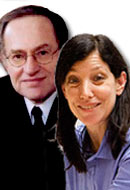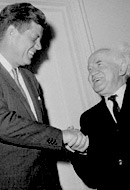Zionist Thought
 Hebrew School
Hebrew SchoolWednesday, June 22, 2011 by Allan Arkush | Jewish Ideas Daily » Daily Features
Samson Benderly, one might say, had crusading in his blood. A direct descendant of Jacob Emden, the zealous 18th-century European battler against Sabbateanism, he spent his youth in Palestine before coming to the United States in 1898 with the aim of becoming a physician.
 Is Israel’s Labor Party Finished?
Is Israel’s Labor Party Finished?Tuesday, June 21, 2011 by Elliot Jager | Jewish Ideas Daily » Daily Features
What has become of Israel's left-wing Labor Party some five months after its leader, Defense Minister Ehud Barak, abruptly defected to establish his breakaway Atzmaut (Independence) Knesset faction?
 Anti-Semitism and Man at Yale
Anti-Semitism and Man at YaleMonday, June 13, 2011 by Alex Joffe | Jewish Ideas Daily » Daily Features
The modern university is no longer made up simply of departments and regular professors teaching students. Ancillary centers, programs, and initiatives proliferate, undertaking research on every conceivable topic. The fates of such entities rarely make the New York Post. But anti-Semitism is not a normal subject.
 Before the Law
Before the LawTuesday, June 7, 2011 by Suzanne Last Stone and Alan M. Dershowitz | Jewish Ideas Daily » Daily Features
The holiday of Shavuot, which falls this year on June 8 and 9, commemorates the giving of the Law. In video interviews conducted by the Israeli media agency Leadel, the prominent legal scholars Suzanne Last Stone and Alan M. Dershowitz explain the differences between Jewish law and Western law, and how their own interest in the former has informed their careers in the latter. —The Editors
 The Anthropology of AIPAC
The Anthropology of AIPACTuesday, May 31, 2011 by Alex Joffe | Jewish Ideas Daily » Daily Features
Few events in contemporary American Jewish life generate as much passion as the annual policy conference of the American Israel Public Affairs Committee (AIPAC), held in Washington this year on May 22-24. The best way to view the over 10,000 conference participants may be in terms of a tribe or small society.
 American Orthodoxy and Its Discontents
American Orthodoxy and Its DiscontentsFriday, May 27, 2011 by Lawrence Grossman | Jewish Ideas Daily » Daily Features
A "case study in institutional decay": that description of Orthodox Judaism in America was offered in 1955 by the late sociologist Marshall Sklare. It has long since entered the gallery of scholarly misjudgments, acknowledged as such by Sklare when events turned out to belie his assessment.
 No Springtime for Palestinians?
No Springtime for Palestinians?Wednesday, May 25, 2011 by Sol Stern | Jewish Ideas Daily » Daily Features
In his May 19 speech celebrating the Arab Spring, President Obama expressed enthusiasm for the "movements for change" that have been unseating tyrants previously supported or tolerated by the United States. In language echoing that of his despised rival George W. Bush, he adopted as his own the idea of promoting democracy in the Middle East.
 Israel and Western Guilt
Israel and Western GuiltFriday, May 20, 2011 by Aryeh Tepper | Jewish Ideas Daily » Daily Features
"Confront Your Privilege." So reads a "subtly coercive" sign on display at tony American liberal-arts colleges. Why coercive? Because, as Wilfred McClay explains in an illuminating recent essay in First Things, what such signs are really telling the students is, "Feel Guilty."
 What Would Ben-Gurion Do?
What Would Ben-Gurion Do?Thursday, May 19, 2011 by Elliot Jager | Jewish Ideas Daily » Daily Features
How would David Ben-Gurion handle himself if he were the one scheduled to meet Barack Obama on May 20 and address a joint session of the U.S. Congress a few days later? That hypothetical question has been aired frequently by Israelis in the run-up to Benjamin Netanyahu's pending appointments in Washington.
 Beyond “Religious” and “Secular”
Beyond “Religious” and “Secular”Wednesday, May 11, 2011 by Yehudah Mirsky | Jewish Ideas Daily » Daily Features
What should be the place of the Jewish religion in a Jewish state? There are many putative answers to this question, and the answers have changed over time. When Zionism was still an aspiration, a great blank yet to be filled in, the terms of debate were set by a self-confidently secular dispensation preoccupied with state- and institution-building. In the first few decades of statehood, religion, though state-established, was clearly subservient.
Editors' Picks
Digging that Hole Efraim Karsh, Hudson New York. Attempting to defend his political science department against charges of bias, one professor betrayed the true depth of the problem by likening Israel to Nazi Germany in several key respects.
Israeli Inflation Ronen Bergman, New York Times. The rising cost of the life of an Israeli hostage, from the Entebbe raid to the Shalit deal.
Right Turn? Evelyn Gordon, Contentions. Yitzhak Rabin is idolized by those who claim that Israel's population has become more conservative—a claim that Rabin's own record refutes.
Pledges and Gag Rules Jonathan S. Tobin, Contentions. While the cause of Jewish unity is noble, a new "National Unity Pledge for Israel" is clearly intended to shut down accountability on the issue from those in power.
When Qaddafi Courted the Jews Ron Kampeas, JTA. What led Qaddafi to cultivate back-channel relationships with Jews and the U.S. over the past decade? And why were Jews receptive to the dictator's overtures?
Sex, Drugs, and Tourism Philip Getz, Jewish Review of Books. Birthright Israel has spent $600 million treating more than 260,000 young Jews to educational tours of Israel. Will it change the trajectory of Jewish life in the Diaspora?
To Ransom or Not to Ransom? Aryeh Tepper, Jewish Ideas Daily. As demands for the release of captive soldiers grow ever more exorbitant, when is the price simply too high to pay?
Who's a Zionist? Sol Stern, City Journal. Those who support policies that endanger Israel, suggests the founder of J Street.
The Heartbreaking Boy Gilad Ari Shavit, Haaretz. There are many good reasons to oppose the deal for the release of Gilad Shalit. But until history has its say, let us rejoice in the kidnapped soldier's homecoming.
A State is Born Ronen Bergman, New York Times. How did the (possibly pro-Arab) United Nations Special Committee on Palestine come to recommend the creation of Israel in 1947?

